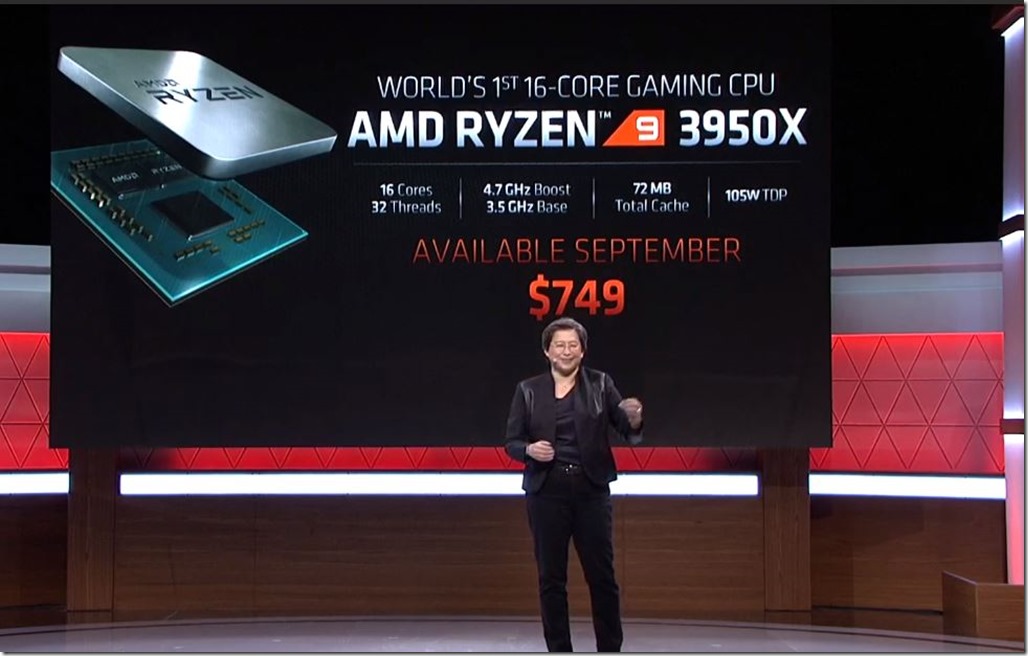(Glenn’s Technical Insights… used to be part of our bi-weekly newsletter but we decided to make it a regular blog post instead so it can get more visibility. It covers interesting new hardware and software developments that are generally relevant for SQL Server). It also can just be technically-oriented items that I find interesting.
AMD Threadripper 3000 Series
More information has been leaking regarding the upcoming release of the 3rd generation, Zen 2 AMD Ryzen Threadripper 3000 processors. These 7nm HEDT processors are supposed to be officially announced on November 5, 2019, and two of the SKUs are rumored to be available for sale on November 19, 2019. The series will start with a 24C/48T Ryzen Threadripper 3960X and a 32T/64C Ryzen Threadripper 3970X. These will be accompanied by new TRX40 chipset motherboards that will be available at the same time.
The initial announcement and release will be followed by one or two higher-end SKUs that will be released in January 2020. These would be the 48C/96T Ryzen Threadripper 3980X and the flagship 64C/128T Threadripper 3990X. So far, we don’t know other specifications like clock speeds, cache sizes, or how much IPC gain these processors will have compared to the previous 2nd generation Threadripper processors. They are supposed to have PCIe 4.0 support, and will likely have more PCIe lanes and higher memory capacity than their predecessors.
Needless to say, I am pretty excited about 3rd Generation Threadripper. I think it is going to extend AMD’s dominance in the HEDT market. The “entry-level” 7nm 24C/48T AMD Ryzen Threadripper 3960X HEDT processor should compare very favorably with the recently released “high-end” 14nm 18C/36T Intel Core i9-10980XE Extreme Edition HEDT processor. The AMD processor will definitely have better multi-threaded performance, as you would expect from having 24 vs. 18 cores.
It is also likely to have better single-threaded performance than Intel. It will also have more PCIe bandwidth (from a combination of Gen 4 support and having more total lanes). The AMD processor will probably cost about the same as the Intel processor, and it will be using a more modern, feature-rich TRX40 chipset compared to Intel’s refreshed X299 chipset. This is pretty amazing, with the entry-level AMD HEDT SKU beating the high-end Intel HEDT SKU in nearly every measure.
Building one of these very powerful desktop machines is still going to be fairly expensive, typically in the $3000-$5000 range depending on exactly what components you choose. That is a lot of money, but for people who actually make money using the full horsepower of a HEDT machine, it will be worth it. If you don’t need that much horsepower, you will also have another, less expensive choice from AMD
AMD Ryzen 9 3950X Processor
Intel’s woes will continue when the 16C/32T AMD Ryzen 9 3950X mainstream desktop processor is released in November. This is the flagship Zen 2 desktop processor that has a base clock speed of 3.5GHz, a max boost clock speed of 4.7GHz and 64MB of L3 cache. AMD is said to be binning better quality Zen 2 processor cores for the $749.00 flagship 3950X compared to the lower-end SKUs in that product family. This means that they will reliably run at higher max boost speeds more often.

Figure 1: AMD Ryzen 9 3950X
Another advantage is that Zen 2 has been out since July 7, 2019, so there has been time for AMD to improve the AMD Generic Encapsulated Software Architecture (AGESA) firmware and their chipset drivers compared to the initial release versions, which has improved performance. Remember, you want to make sure you have the latest BIOS version, latest AMD chipset drivers, and Windows 10 Version 1903 (or later) to get the best performance from a Zen 2 processor.
There have been some leaked benchmarks showing the mainstream Ryzen 9 3950X beating the HEDT Intel Core i9-10980XE processor. These leaked benchmarks are not on exactly comparable systems (with different video cards and different memory speeds), so keep that in mind.
The bottom line for me is that for most desktop workloads, you can get much better overall performance for much less money with an AMD Zen 2 system compared to an Intel system. One exception is 1080P gaming, where your video card is not a bottleneck. In this scenario, the fastest, most expensive Intel desktop processors, such as the Intel Core i9-9900K and upcoming Intel Core i9-9900KS will have higher frame rates on some, but not all games. If you are gaming at 2K or 4K, you will be better off with a more affordable AMD Ryzen 7 3700K, and then spending the money you saved on the processor on a better video card.
For general desktop usage and content creation scenarios, having more cores (such as the 12C/24T AMD Ryzen 9 3900X or the 16C/32T AMD Ryzen 9 3950X) is going to be much more useful most of the time. If you are on a budget, the 6C/12T AMD Ryzen 5 3600 or the 8C/16T AMD Ryzen 7 3700X are excellent choices.